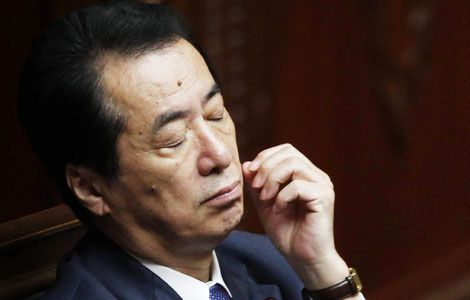Retrial of murder case triggers new controversy
Updated: 2011-08-23 21:51
(Xinhua)
|
|||||||||||
KUNMING - A controversial case seems to have come to an end after a rare retrial toppled the final verdict and sentenced a rapist and murderer to death on Monday in southwest China, but the butterfly effect it has stirred may just start.
The news of the retrial of 29-year-old Li Changkui, a farmer in Yunnan Province who pled guilty to raping a 19-year-old girl before killing her and her three-year-old brother in 2009, drew more than 40,000 comments within a day at China's major portal website Sina.com.
Most netizens responding believed the retrial sentence was fair, while some law experts worry that intervention from public opinion, like in the case of Li, may affect judicial procedure. The experts are also concerned the retrial of Li may encourage imitations in similar cases.
In March, Li was given a death sentence with a two-year reprieve by the Yunnan Provincial People's Court, which was accused by public outcry as being "too lenient." In China, a death penalty with reprieve often results in life imprisonment, not execution.
According to Chinese law, a final verdict usually cannot be changed unless a prosecutor at a higher level appeals to the judge, a higher level court orders a retrial, or the head of the court which issued the final verdict found loopholes and believed it necessary for a retrial, said Yuan Bin, an associate professor of criminal law studies with Beijing Normal University.
In Li's case, the retrial by the provincial Higher People's Court came after the Yunnan Provincial People's Procurator stated that the "previous ruling was too lenient" in the retrial decision document.
The head of the court believed it necessary to rehear the case.
Following the retrial, a court spokesman said Li deserved the death penalty, as "his motivation was evil, his conduct was cruel and the consequences [of his actions] were serious."
Wang Yong, a lawyer for the victims' family, said after the retrial that "justice has been done."
Supporters of the retrial were also dominant in online communities.
A poll on Sina Weibo, a Chinese Twitter-like service, showed that as much as 94 percent of the 10,671 netizens responding believed that Li should be executed. A similar poll conducted on China's popular website QQ (www.qq.com) yielded comparable results.
"It is good that the court corrected its mistake," netizen Guotaiminan3 wrote.
Another visitor to the site wrote, "this result showed the power of justice."
Li's lawyer Zhang Qingsong, however, was concerned that the retrial could lead to negative results.
"On one hand, public belief in the seriousness of court rulings could be shaken and verdicts would seem like child's play," he said. "On the other hand, more people would pin hopes on retrials. They could try to influence ruling with social opinion."
Actually, the lawyer's worry was not unfounded.
Outside the retrial court on Monday, some people, including the mother of a 21-year-old girl who died of 27 stab wounds inflicted by a wooer of hers in 2008, approached court staff and journalists, saying that the verdicts for the murderers of their relatives were not fair and required retrials.
Some journalists later received phone calls asking for help, saying that their relatives were killed but murderers were only given death with reprieve.
Hopes for a fair, unified court system
The case of Li Changkui has been compared to that of Yao Jiaxin, a university student who stabbed a 26-year-old woman to death to cover up his crime of hitting her with his car last October in Xi'an, Shaanxi Province.
Yao was executed in June.
Netizens believed that Li's crime was more cruel than Yao's. If his ruling was more lenient, it would be unfair.
"In a way, the awkward retrial showed problems in legal standards," Yuan Bin said.
According to the law, for instance, culprits should be sentenced to death if their "motivation was evil, conduct was cruel and the consequences were serious," Yuan said. "But how serious means 'serious?'"
He noted that relevant regulations should be further specified so that a unified standard for reprieve can be adopted by all courts.
Meanwhile, Gao Wei, an associate professor with the Yunnan University Law School, said that the public outcry effectively showed people's hopes for judicial transparency.
"The judgement should be explicit and convincing, so as to dispel people's doubts about a shady deal," he said.
Public opinion could be viewed as a justice monitor, but He Weifang, a professor with the Beijing University Law School, said that the courts should have their own guidelines, rather than basing retrials on public opinion.
Yuan, however, believes courts should make their rulings more fair.
"Therefore, there will be less public doubt," he said. "Even if there are doubts, the courts could be more confident with nothing on their consciences."
Hot Topics
Anti-Gay, Giant Panda, Subway, High Speed Train, Coal Mine, High Temperature, Rainstorm, Sino-US, Oil Spill, Zhu Min
Editor's Picks

|

|

|

|

|

|






